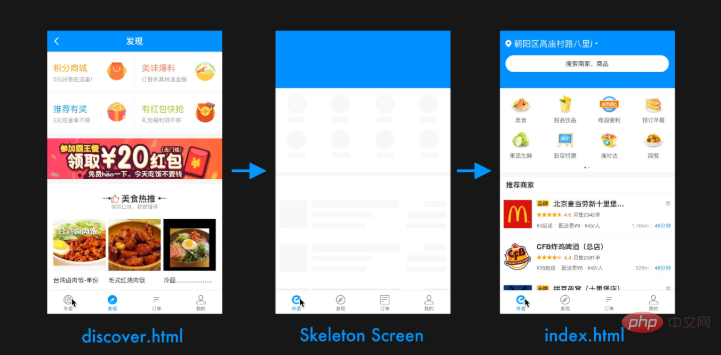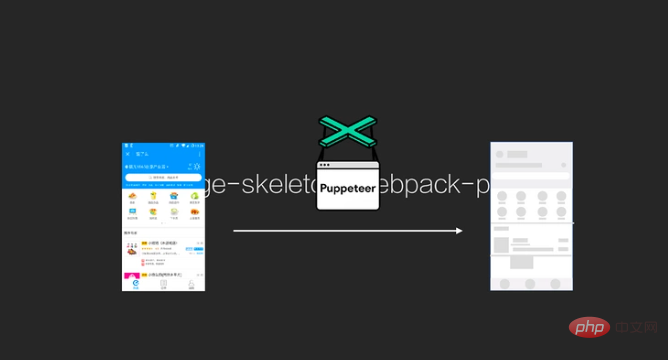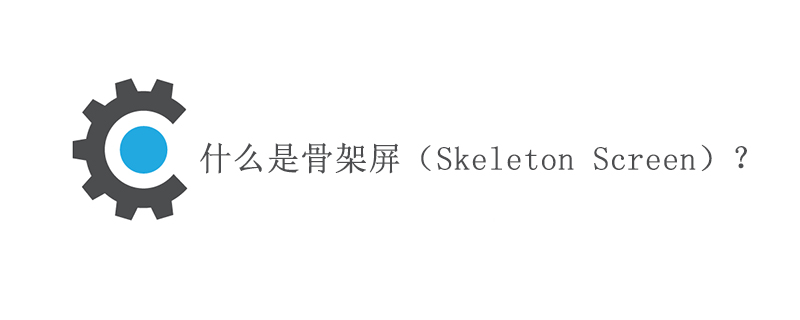What is Skeleton Screen?
##Skeleton Screen
Recently, there has been a need for skeleton screens from time to time in projects, so I took the time to do some research on the skeleton screen plan. There have been many practices of skeleton screens, and many people have introduced their own solutions. Here I have summarized and classified them based on my personal understanding and shared them with everyone.Recommended tutorials: "
About Skeleton Screen (Introduction)
The skeleton screen shows the user the general structure of the page before the page data is loaded, and then renders the page after the requested data is returned to supplement the data content that needs to be displayed. It is often used for relatively regular list pages such as article lists and dynamic list pages. It has been applied in many projects: ex: Ele.me h5 version, Zhihu, Facebook and other websites have applications.
Let’s take a picture as an example: 
Two types of uses
The use is explained in the introduction, but you can still continue to elaborate. Points:- is used as the loading for routing switching in spa, combined with the life cycle of the component and the timing of the ajax request return.
- is used as the first Optimization of screen rendering.
First type of use
The first type of use requires you to write the skeleton screen yourself. We recommend two mature and easy to customize A solution for customizing svg components into skeleton screens- react-content-loader
- vue-content-loader
As first screen rendering (automated solution)
This solution is a set of solutions summarized by Ele.me in the practice of skeleton screens:- The dom structure and css of the skeleton screen are injected under the nodes in the template when they are built after offline generation.
- Principle related eleme skeleton screen plug-in implementation principle
- Project address of the solution: page-skeleton-webpack-plugin
- Notes when using:
- Principle:
After the rendering is completed, on the premise of retaining the page layout style, delete or add elements on the page, and overwrite the existing elements in a cascading manner
, so that the page does not change Under the layout, hide the pictures and text and cover them with styles so that they are displayed as gray blocks. Then
extract the modified HTML and CSS styles, so that it is the skeleton screen.

Other solutions
Use it in combination with ssr render/prerender:- Pre-write the skeleton screen component and inject it into the html file through ssr render analysis (except that you need to write it yourself, the process is similar to the automation solution above) Reference The skeleton screen component written in advance in article
- 1 can be replaced by a picture (svg); or the designer can design it.
- There is no concept of pre-rendering, but you can still pre-write the skeleton screen component yourself and put it in the page, and wait until the asynchronous request data comes back. Update page.
- ## Recommended related tutorials: "
" "PHP Getting Started to Mastery"
The above is the detailed content of What is Skeleton Screen?. For more information, please follow other related articles on the PHP Chinese website!

Hot AI Tools

Undresser.AI Undress
AI-powered app for creating realistic nude photos

AI Clothes Remover
Online AI tool for removing clothes from photos.

Undress AI Tool
Undress images for free

Clothoff.io
AI clothes remover

Video Face Swap
Swap faces in any video effortlessly with our completely free AI face swap tool!

Hot Article

Hot Tools

Notepad++7.3.1
Easy-to-use and free code editor

SublimeText3 Chinese version
Chinese version, very easy to use

Zend Studio 13.0.1
Powerful PHP integrated development environment

Dreamweaver CS6
Visual web development tools

SublimeText3 Mac version
God-level code editing software (SublimeText3)

Hot Topics
 1386
1386
 52
52
 How to use bootstrap in vue
Apr 07, 2025 pm 11:33 PM
How to use bootstrap in vue
Apr 07, 2025 pm 11:33 PM
Using Bootstrap in Vue.js is divided into five steps: Install Bootstrap. Import Bootstrap in main.js. Use the Bootstrap component directly in the template. Optional: Custom style. Optional: Use plug-ins.
 The Roles of HTML, CSS, and JavaScript: Core Responsibilities
Apr 08, 2025 pm 07:05 PM
The Roles of HTML, CSS, and JavaScript: Core Responsibilities
Apr 08, 2025 pm 07:05 PM
HTML defines the web structure, CSS is responsible for style and layout, and JavaScript gives dynamic interaction. The three perform their duties in web development and jointly build a colorful website.
 How to write split lines on bootstrap
Apr 07, 2025 pm 03:12 PM
How to write split lines on bootstrap
Apr 07, 2025 pm 03:12 PM
There are two ways to create a Bootstrap split line: using the tag, which creates a horizontal split line. Use the CSS border property to create custom style split lines.
 Understanding HTML, CSS, and JavaScript: A Beginner's Guide
Apr 12, 2025 am 12:02 AM
Understanding HTML, CSS, and JavaScript: A Beginner's Guide
Apr 12, 2025 am 12:02 AM
WebdevelopmentreliesonHTML,CSS,andJavaScript:1)HTMLstructurescontent,2)CSSstylesit,and3)JavaScriptaddsinteractivity,formingthebasisofmodernwebexperiences.
 How to set up the framework for bootstrap
Apr 07, 2025 pm 03:27 PM
How to set up the framework for bootstrap
Apr 07, 2025 pm 03:27 PM
To set up the Bootstrap framework, you need to follow these steps: 1. Reference the Bootstrap file via CDN; 2. Download and host the file on your own server; 3. Include the Bootstrap file in HTML; 4. Compile Sass/Less as needed; 5. Import a custom file (optional). Once setup is complete, you can use Bootstrap's grid systems, components, and styles to create responsive websites and applications.
 How to resize bootstrap
Apr 07, 2025 pm 03:18 PM
How to resize bootstrap
Apr 07, 2025 pm 03:18 PM
To adjust the size of elements in Bootstrap, you can use the dimension class, which includes: adjusting width: .col-, .w-, .mw-adjust height: .h-, .min-h-, .max-h-
 How to insert pictures on bootstrap
Apr 07, 2025 pm 03:30 PM
How to insert pictures on bootstrap
Apr 07, 2025 pm 03:30 PM
There are several ways to insert images in Bootstrap: insert images directly, using the HTML img tag. With the Bootstrap image component, you can provide responsive images and more styles. Set the image size, use the img-fluid class to make the image adaptable. Set the border, using the img-bordered class. Set the rounded corners and use the img-rounded class. Set the shadow, use the shadow class. Resize and position the image, using CSS style. Using the background image, use the background-image CSS property.
 How to use bootstrap button
Apr 07, 2025 pm 03:09 PM
How to use bootstrap button
Apr 07, 2025 pm 03:09 PM
How to use the Bootstrap button? Introduce Bootstrap CSS to create button elements and add Bootstrap button class to add button text





